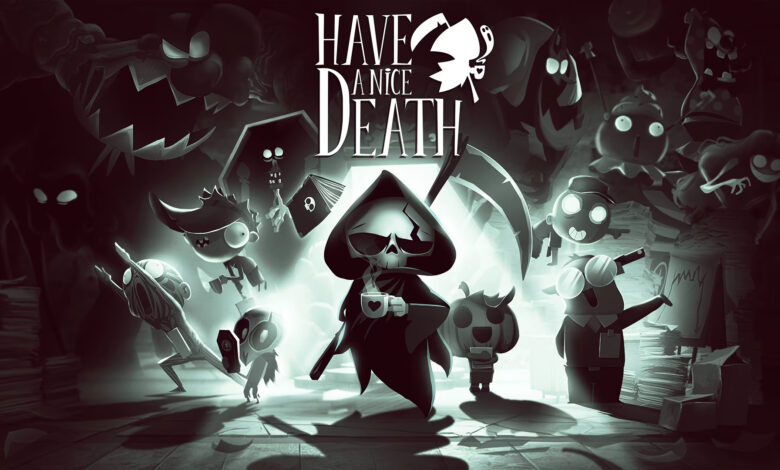Have a Nice Death: The Afterlife is a Bureaucracy
Why the Idea of a Paperwork-Filled Afterlife Works so Well

Gearbox Publishing’s upcoming Have a Nice Death features an overworked Grim Reaper, bogged down in paperwork, longing for a vacation. But before he can leave he must subdue several of his Sorrows, entities he’s subcontracted his reaping to. They’ve grown a bit over-zealous and reaped WAY too many souls.
The game looks to be a fun, roguelike, beautiful hand-drawn 2-D platformer. But the overall premise of its plot contains some well-used tropes; the Grim Reaper, an afterlife similar to our own, souls that have escaped and must be collected. How long have these ideas been around, and might they actually elevate the game?
Death; the guy in charge

The concept of a ‘Grim Reaper,’ a frightening, otherworldly creature who ferries souls to what lies beyond life, is an obvious well-known character. From classic films like The Seventh Seal to comedy fare such as the Bill & Ted series, Death in his black cloak, with his skull-like (or sometimes just plain skeletal) face, carrying his scythe might be one of the most recognizable (and marketable) after-life images. He’s been both terrifying and nonchalant depending on how he’s being portrayed.
A burnt-out-with-his-job Death has been featured in episodes of Family Guy. His frustration with souls can be seen all the way back to Terry Pratchet’s classic Discworld novels. Adding humanity to the character, removing him from just an elemental force that reaps souls, to a typical guy with a job makes Death more relatable, less scary, and downright funny at time.
Following this line of thought creators then started to imagine what the behind the scenes job of soul reaping was like. If Death was an Average Joe doing a job, what was this afterlife he worked in life? This gave birth to the most important trope used in Have a Nice Death; the afterlife as a tedium of paperwork and bureaucracy.
Endless drudgery of eternal filing

Since no one knows what happens after we die and its incredibly hard to conceive of our personal ‘self’ changing in an afterlife. A typical reaction to passing away is to image another plane of existence where we’re basically still ‘us’ for eternity. And since much of the world we live in today is governed by paperwork, it becomes humorous to picture that idea to the Nth degree in the hereafter, all the filing and forms being an eternal process.
Certainly the most notable examples on film would be the 1988 Tim Burton classic Beetlejuice. Albert Finney’s Defending Your Life took a similar approach in 1991, and then Robert Schwentke took it a step further with 2013’s RIPD. But while that film’s afterlife was certainly a bureaucracy, it had the next important trope; collecting the souls of the dead who’d escaped from the afterlife.
Interactive soul collector

Retrieving escaped souls just lends itself to good narrative fiction. Show like the oft-forgotten comedy series Reaper and even cartoons such as The 13 Ghosts of Scooby-Doo have latched on to this idea as their guiding premise. But within the video game world, this concept was gold.
Going all the way back to Pac-Man needing to collect pellets, video game designers have looked for a story element to give gamers a goal to acheive. LucasArts’ 1998 classic Grim Fandango toyed with the idea of what happens to souls after death, as well as the paperwork involved. The 2005 PlayStation Portable flagship game Death Jr. played around with the soul collecting demons from Pandora’s Box. Even the recent hit Cuphead from Studio MDHR uses reclaiming soul contracts as the driving force for its protagonists.
This simple idea also plays well into preconceived notions of the afterlife. We lose our physical bodies in death, but our soul remains. If this is the essence of who we are, in a sense rescuing them is the classic hero saving the damsel or (to use the archaic version) swain in distress. Although nobody makes ‘Swain in Distress’ stories.
To play for death (or even as him!)

The vast number of indie game producers on the market these days have access to crowd funding platforms like Kickstarter and Indiegogo. Game developers no longer have to hope to get hired by big name software companies to get their games created. Online game sites such as Steam and GOG have given a platform at a much cheaper cost than some of the consoles available. This has all allowed so many unique, quirky, and fascinating games to see the light of day and be available to more fans than ever.
The trope of a paperwork-heavy afterlife and a Death-like character collecting souls is not a new concept. It’s one that has grown over the years. It’s reached the point where it’s normal to see it. In the last few years, Devolver Digital released Death’s Door. The game sees you play as a clock punching crow that reaps souls. You must venture to a bizarre world without death, collecting the twisted souls of those that should’ve died long ago.
The culmination of the perfect afterlife

Have a Nice Death just might be the perfect amalgamation of all these elements. It features the bureaucracy-overloaded realm. It has the main character collect souls. And it features overgrown, powerful bosses. The attention to detail that Gearbox put into the look and feel, just from the trailers alone enhance the art. With all that has come before it, the world created in Have a Nice Death is a world we know. We’re comfortable with it, and the game is going to allow players to experience the familiar world. Plus you’ll get to hack and slash bad guys.
Have a Nice Death pulls a lot of great elements of the past together. In fact, it merges them in such a way that its interpretations evolve past overused tropes for something larger.
Have a Nice Death launches on March 8, 2023 on the Nintendo Switch and the Steam Store. Are you excited for this fun, artistic look at the afterlife? Leave us a comment!

